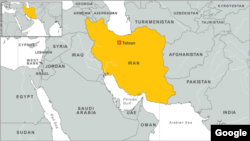ສະຫະລັດກ່າວວ່າ ຕົນກຳລັງຊອກຫາການສະໜັບສະໜູນຂອງພັນທະມິດເພື່ອ ບັງຄັບ
ໃຫ້ອີຣ່ານ ເຂົ້າຮ່ວມການເຈລະຈາຄັ້ງໃໝ່ ກ່ຽວກັບການພັດທະນາອາວຸດ ນິວເຄລຍ
ແລະການຂະຫຍາຍການມີໜ້າທາງທະຫານ ຢູ່ໃນພາກຕາເວັນອອກກາງ ຫລັງຈາກປະທານາທິບໍດີດໍໂນລ ທຣໍາ ທີ່ໄດ້ຖອນສະຫະລັດ ອອກຈາກຂໍ້ຕົກລົງສາກົນສະບັບປີ
2015 ເພື່ອຢັບຢັ້ງໂຄງການນິວເຄລຍຂອງອີຣ່ານ.
ລັດຖະມົນຕີຕ່າງປະເທດທ່ານໄມຄ໌ ພອມພິໂອ ກຳລັງວາງແຜນທີ່ຈະຫາລືກັບບັນດາ
ພັນທະມິດໃນຢູໂຣບ ພາກຕາເວັນອອກກາງ ແລະເອເຊຍໃນຄວາມພະ ຍາຍາມຊອກ
ຫາການສະໜັບສະໜູນຂອງພວກເຂົາເຈົ້າ ເພື່ອກົດດັນໃຫ້ອີຣ່ານເປີີດການເຈລະຈາ ອີງຕາມລາຍງານຂອງອົງການຂ່າວຣອຍເຕີໃນວັນພະຫັດວານນີ້. ນື່ງມື້ກ່ອນນັ້ນ ລັດຖະ
ມົນປ້ອງກັນປະເທດ ທ່ານຈິມ ແມັຕຕິສ ລາຍງານ ໃນການໃຫ້ການຕໍ່ລັດຖະສະພາວ່າ ສະຫະລັດຈະ “ສືບຕໍ່ ປະຕິບັດງານຄຽງຂ້າງກັບພັນທະມິດຂອງພວກເຮົາ ແລະຄູ່ຮ່ວມ
ງານ ເພື່ອຄໍ້າປະກັນວ່າ ອີ ຣ່ານຈະບໍ່ສາມາດທີ່ຈະສ້າງອາວຸດນິວເຄລຍແລະຈະເຮັດ
ວຽກກັບປະເທດອື່ນໆເພື່ອຮັບມືກັບອິດທິພົນທີ່ເປັນອັນຕະລາຍຂອງອີຣ່ານ.”
ອີງຕາມເຈົ້າໜ້າທີ່ອະວຸໂສຂອງກະຊວງຕ່າງປະເທດສະຫະລັດ ທີ່ໄດ້ເລີ້ມການຫາລື
ກັບອັງກິດ ຝຣັ່ງ ແລະເຢຍຣະມັນ ສາມປະເທດທີ່ໄດ້ລົງນາມໃນຂໍ້ຕົກລົງນິວເຄລຍກັບ
ອີຣ່ານ ທີ່ບໍ່ສຳເລັດຊັກຊວນປະທານາທິບໍດີທຣໍາ ໄດ້ຢ່າງສຳເລັດຜົນ ເພື່ອໃຫ້ສະຫະ
ລັດຢູ່ໃນຂໍ້ຕົກລົງດັ່ງກ່າວຕໍ່ໄປ ພ້ອມກັບຍີ່ປຸ່ນ ອີຣັກ ແລະອິສຣາແອລ.
ເຈົ້າໜ້າທີ່ໄດ້ກ່າວຕໍ່ອົງການຂ່າວຣອຍເຕີວ່າ “ຈະມີການດຳເນີນ ຄວາມພະຍາຍາມ
ອອກໄປຢູ່ທົ່ວໂລກ ແລະຫາລືກັບບັນດາເພື່ອນຮ່ວມງານາຂອງພວກເຮົາຢູ່ທົ່ວໂລກ
ທີ່ມີຜົນປະໂຫຍດຮ່ວມກັນກັບພວກເຮົາ. ນັ້ນແມ່ນຂັ້ນທຳອິດ. ການປະກອບວ່າ ແມ່ນ
ຫຍັງຈະເກີດຂຶ້ນເວລາພວກເຮົານັ່ງລົງກັບອີຣ່ານນັ້ນ ແມ່ນຍັງ ຢູ່ອີກຫຼາຍຂັ້ນຕອນ."
ເຈົ້າໜ້າທີ່ກ່າວວ່າ ການເນັ້ນໜັກຂອງການຫາລືກໍຄືເພີ້ມຄວາມກົດດັນຕໍ່ອີຣ່ານ “ໃນ
ທາງສ້າງສັນ ແລະເປັນຜົນປະໂຫຍດທີ່ຈະນຳເຂົາເຈົ້າມາສູ່ໂຕະເຈລະຈາ.”
ປະທານາທິບໍດີທຣໍາກ່າວວ່າ ຍັງເປັນການໄວເກີນໄປ ທີ່ຈະວາງມາດຕະການລົງໂທດເສດຖະກິດຄືນໃໝ່ຕໍ່ອີຣ່ານ ທີ່ໄດ້ສິ້ນສຸດລົງໃນປີ 2015 ເວລາອີຣ່ານຕົກລົງທີ່ຈະຫຼຸດ
ຜ່ອນໂຄງການນິວເຄຍຂອງຕົນ ແລະຈຳກັດເຂົາເຈົ້າເຂົ້າ ໃນຄວາມຫວັງເພື່ອບັງຄັບ
ໃຫ້ອີຣ່ານ ກັບຄືນເຂົ້າຮ່ວມການເຈລະຈາໃໝ່. ການລົງໂທດກ່ອນນັ້ນໄດ້ເຮັດໃຫ້ເສດຖະກິດອີຣ່ານຊັກຊ້າ ແລະການລົງໂທດຄືນໃໝ່ ອາດສ້າງບັນຫາເພີ້ມຂຶ້ນ.
ປະທານາທິບໍດີທຣໍາກ່າວໃນວັນພຸດທີ່ຜ່ານມານີ້ວ່າ “ອີຣ່ານຈະກັບຄືນມາ ແລະກ່າວ
ວ່າ “ພວກເຮົາບໍ່ຕ້ອງການເຈລະຈາ. ແລະແນ່ນອນ ເຂົາເຈົ້າຈະກ່າວດັ່ງນັ້ນ. ແລະຖ້າ
ຫາກຂ້າພະເຈົ້າຢູ່ໃນໜ້າທີ່ເຂົາເຈົ້າ ຂ້າພະເຈົ້າກໍຈະກ່າວເຊັ່ນກັນ ໃນໄລຍະສອງສາມ
ເດືອນທຳອິດ “ພວກເຮົາຈະບໍ່ເຈລະຈາ.”
The U.S. says it is looking for allied support to force Iran into new negotiations over its nuclear weapons development and military advances in the Middle East in the aftermath of President Donald Trump's withdrawal from the 2015 international pact restraining Tehran's nuclear program.
Secretary of State Mike Pompeo is planning discussions with allies in Europe, the Middle East and Asia in an effort to win their support to pressure Iran to open talks, Reuters reported Thursday. A day earlier, Defense Secretary Jim Mattis told a congressional hearing the U.S. would "continue to work alongside our allies and partners to ensure that Iran can never acquire a nuclear weapon, and will work with others to address the range of Iran's malign influence."
The U.S., according to a senior State Department official, already has started discussions with Britain, France and Germany — three other signatories to the Iran nuclear deal that unsuccessfully lobbied Trump to keep the U.S. in the deal — as well as Japan, Iraq and Israel.
"There will be an effort to go out globally and talk to our partners around the world who share our interests," the official told Reuters. "That is the first stage. The composition of what happens when we sit down with the Iranians is several stages out."
The official said the focus of the talks is to increase pressure on Iran "in a way that is constructive and conducive to bringing them to the negotiating table."
Trump has vowed to soon reimpose economic sanctions against Iran that were ended in 2015 when Iran agreed to curbs on its nuclear program, and stiffen them in hopes of forcing Iran into new talks. The earlier sanctions had hobbled the Iranian economy and renewed sanctions could pose more problems.
"Iran will come back and say, 'We don't want to negotiate,'" Trump said Wednesday. "And of course they're going to say that. And if I were in their position, I'd say that, too, for the first couple months: 'We're not going to negotiate.'"
"But they'll negotiate, or something will happen," Trump said. "And hopefully that won't be the case."
The U.S. leader said that if Iran restarts work on nuclear weaponry there would be a "very severe consequence."
John Bolton, Trump's national security adviser, said in an opinion piece Wednesday in The Washington Post that the U.S. believes the Iran deal is a failure because Tehran, with sanctions lifted, used the economic windfall to create military chaos in the Middle East rather than improve the plight of its people.
"Rather than focusing on behaving responsibly, Tehran has poured billions of dollars into military adventures abroad, spreading an arc of death and destruction across the Middle East from Yemen to Syria," Bolton said. "Meanwhile, the Iranian people have suffered at home from a tanking currency, rising inflation, stagnant wages and a spiraling environmental crisis."
Bolton said Trump "has been willing to take unconventional action to turn momentum to America's favor. The Iran deal is not an inescapable trap — it's merely an inadequate deal that couldn't withstand serious scrutiny."





